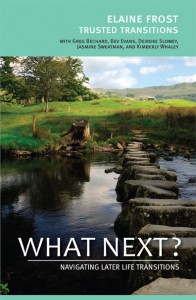SHOULD I STAY? SHOULD I GO?
My father had turned 80 when I started to worry. He lived alone in the 4 bedroom house he and my mom bought 35 years before, the home I had known since I was a teenager. He is an insulin dependent diabetic and not that keen on kitchen activities. Given that, and the fact that he hated eating alone, I was sure that his diet wasn’t what it should be. Of course the house demanded ongoing maintenance activities which he didn’t have the ability to do anymore, so the tasks fell to son or sons-in-law or hired helpers. When he developed some difficulties with his legs he started staying at home more. His friends were of the same age and various issues kept them from being as active, or driving at night, so suddenly his busy social life had slowed dramatically.
Is this sounding familiar?
When I voiced my concerns to Dad and cautiously raised the question of moving to an apartment, condo or retirement residence, he didn’t say no, but he wasn’t very enthusiastic either. Change isn’t fun under the best of circumstances and, like most seniors today, leaving a home that is so familiar and holds so many warm memories just wasn’t something he had ever seriously considered.
Unfortunately it was just a couple of months later that the decision was taken out of our hands. His leg problems developed into gangrene and an amputation was necessary. After rehab he moved into a local Retirement Residence. Since then I’ve talked and worked with many seniors and their families. The question of if (and if so when) to make a “move” generates an interesting discussion. Should you take advantage of all the new services and products that make it more comfortable to stay in your home, or should you find smaller, more appropriate living accommodations, such as a Retirement Residence. Do you wait for a crisis or do you go when you are still healthy and active?
There is no right answer to the question of staying or moving. It is a matter of individual needs and preferences. But the conversation is well worth exploring because there are a number of critical factors to consider if you want to make the right decision for yourself or a loved one. And the best time to really think through the potential next steps is when you are still healthy and there isn’t a looming or existing medical crisis to put pressure on everyone.
So where do you start.
The first step is to investigate the options. There are now over 1000 Retirement Residences in Ontario, all with varying levels of accommodations, services, amenities and support options. Many people have a picture in their minds of a dismal hospital-like setting that just doesn’t match reality. The Residences being built today are bright, modern and handsomely decorated. The dining areas resemble upscale restaurants, and there are often specialty areas for full screen movies, fitness activities, reading and even internet surfing. If you visit and take a tour you will usually be invited to stay for lunch then you can get a sense of the menu selection and the quality of the chef.
Like today’s teenagers touring University campuses before deciding where to apply, you will find that if you visit a couple of possibilities you will begin to sense which one feels like the community in which you might be most comfortable living. Second, analyze the Financials. You will want to tally up the costs of staying in your home (including normal home maintenance, home care services, meal preparation etc.) and compare it to the costs at a Retirement Residence. The monthly fees can seem daunting, but they usually include many of the out-of-pocket expenses you have today. An added benefit can be that the monthly fees will be more predictable.
Finally, get out the scales and weigh the pros and cons of moving. What could you get at a Retirement Residence that you can’t easily get at home? What elements of the home life that you love could you not replace in a Retirement community? In my experience the scales tip to moving when either one of two factors exist. The first is when one is seeking more social interaction than they can get at home. When going out is difficult, as it might be (especially) in winter, and visitors don’t come by as much, the socially active person often prefers to live where sharing meals and social activities are just an elevator ride away. The second is when there are medical concerns and family members will sleep better knowing that if anything untoward happens, assistance is just a push of the call button away.
If neither of those factors exist today you should still go through steps one and two so that, if or when they do occur, your homework has already been done.
Five years later Dad is thriving in his Retirement Residence. His social life is more active than ever. And his family knows that medical attention is only moments away should there be a problem. For him, it would have been the right move even if the crisis hadn’t happened. And in hindsight it would have been a less stressful transition if he hadn’t been “forced” to make the move. The key is planning ahead. The next steps are easier to climb if we’ve decided ahead of time which ones to take.
